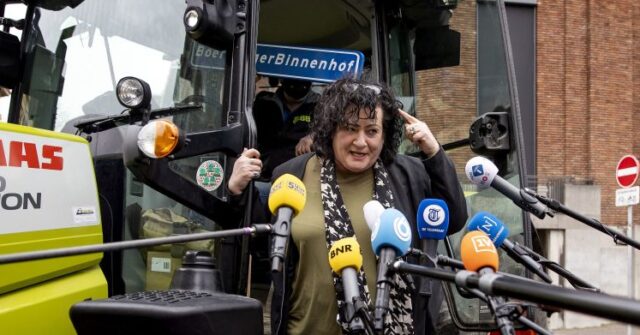

The anti-Great Reset, pro-farmer BoerBurgerBeweging (BBB) movement appears to have won even more seats in the Dutch senate than expected, with the globalist coalition government losing heavily.
The BoerBurgerBeweging (Farmer-Citizen Movement) was founded to represent the interests of Dutch farmers facing severe difficulties or being closed down altogether as a result of Prime Minister Mark Rutte’s efforts to implement European Union-mandated curbs on the use of nitrogen fertilisers, in order to serve the bloc’s climate change green agenda.
Initially a protest movement, the BBB has been involved in many major demonstrations, often involving tractors, in the Netherlands — but it arrived as a political force in the country’s recent regional government elections for the first time, which also determine the make-up of the First Chamber of the States General — the upper house or senate of the Dutch legislature.
As the results of the election become clearer, it now appears to scale of the Farmer-Citizen Movement’s success was greater than polls initially suggested, with it being due to claim 17 seats in the Senate and become by far the largest party there, according to pro-farmer campaigner Eva Vlaardingerbroek.
The precarious four-party coalition government of the supposedly “centre-right” Prime Minister Mark Rutte, meanwhile, appears to have suffered somewhat worse losses than expected, with Vlaardingerbroek suggesting they will be unable to achieve a majority even with the support of the Labour Party and the Greens.
🇳🇱 UPDATE on the Dutch elections!
The final votes have been counted. The BBB (farmers citizens movement) gained a staggering 17 seats and the ruling parties have suffered severe losses and won’t reach a majority – not even with the help of the Green Party + Labour. #DutchFarmers pic.twitter.com/ZQTtB48Riw
— Eva Vlaardingerbroek (@EvaVlaar) March 19, 2023
Vlaardingerbroek has previously alleged that her country is being used as a “pilot” for a broader agenda, with Prime Minister Rutte “very deeply involved in the World Economic Forum [and] a great proponent of all the ideas laid out in the 2030 Agenda and the Great Reset.”
“It’s all related, all these policies are out of those institutions and they are being implemented in our country first, we are sort of the pilot country together with Canada for this agenda,” she added, lamenting the impact of the scheme on farmers targeted by the EU’s Natura 2000 scheme who have in many cases been tending their land and livestock for generations, but now face being forced out of business by state power.
Some members of the Dutch Cabinet have been giving pause by the bloody nose the BBB inflicted on them in the elections, however, with Wopke Hoekstra, who leads the supposedly Christian Democratic Appeal (CDA) party which is in coalition with Prime Minister Rutte’s People’s Party for Freedom and Democracy (VVD), warning the government can no longer simply “move on to the order of the day”.
Dutch PM: Hungary Has No Place in EU After LGBT Teaching Law, Bloc Should Force Hungary ‘to Its Knees’ https://t.co/JnkWZ7sJKq
— Breitbart London (@BreitbartLondon) June 26, 2021
Regardless of the unease on the government benches, however, Dutch politics will not change overnight, given the somewhat labyrinthine mechanism by which the composition of the Dutch Senate is decided.
The Senate’s makeup is determined indirectly by the elections for regional governments — the States-Provincial — whose members then select Senators with the assistance of four electoral colleges representing former Dutch colonies in the Caribbean and Dutch expatriates.
As with U.S. presidential elections, there is a delay between the people casting their votes and their will being implemented by their institutional representatives, but with 99 per cent of votes counted in the provincial elections the seat projections for the formal appointment process for Senators — scheduled for May — are now near-certain to hold true.
Netherlands, regional elections:
Prognosis based on 99% of the vote counted
Senate seat projection
BBB-*: 17 (new)
PvdA/GL-S&D|G/EFA: 15 (+1)
VVD-RE: 10 (-2)
CDA-EPP: 5 (-4)
D66-RE: 5 (-1)
PVV→ID: 4 (-1)
PvdD-LEFT: 4 (+1)
…+/− vs. 2019 election
➤ https://t.co/dz1X5eQdmV pic.twitter.com/upXgQEvu5t— Europe Elects (@EuropeElects) March 19, 2023





